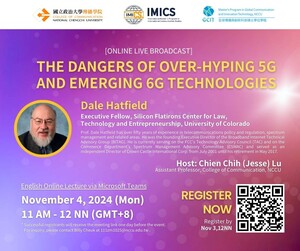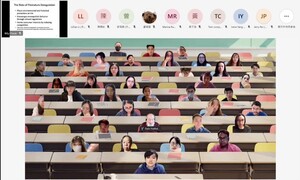Date :
2024-11-13
Department :
International Master's Program in International Communication Studies
【Article by IMICS】
On November 4, the International Master’s Program in International Studies (IMICS) had the honor of hosting Professor Dale Hatfield from the University of Colorado for an inspiring and informative online lecture. Professor Hatfield spoke on the timely and innovative topic of “5G and 6G in Today’s Society,” with a special focus on “The Dangers of Over-Hyping 5G and Emerging 6G Technologies.” This lecture was attended by nearly 60 participants, including Professor Ellen Yi-Luen Do and Professor Mark D. Gross, both from the ATLAS Institute, University of Colorado Boulder, and NCCU students from different country, including China, Taiwan, Hong Kong, Malaysia, Thailand, Singapore, Vietnam, India, the U.S., Russia, France, the Netherlands, Germany, Portugal, Paraguay, and more. Throughout the session, Professor Hatfield engaged with attendees on the future trends, limitations, and challenges of 6G technology. The discussion also explored the potential impacts of 6G on social well-being and the constraints of implementing this emerging technology across industries. Participants appreciated the opportunity to gain insights into the broader implications of 6G and to consider its responsible development.
Professor Dale Hatfield is an executive fellow at the Silicon Flatirons Center for Law, Technology at the University of Colorado at Boulder. Hatfield is an outstanding and prestigious scholar who has over fifty years of experience in telecommunications policy and regulation, spectrum management and related areas.
Concerns, costs, and challenges of 6G networks technology
Professor Hatfield mentioned that achieving reliable, ultra-available 5G and 6G networks may be challenging by several related concerns from different perspective. First, technical and economic constraints was pointed out, for example, the vulnerability to interference, jamming, and spoofing of the network connection issue. Moreover, we may have high infrastructure and maintenance costs in one society when building the 6G network. Secondly, the issue of human and financial costs may require extensive infrastructure and workforce to some extent, not to say the potential risk to public safety. Last but not least, the risk of premature deregulation is also a consideration, for placing environmental and historical protections at risk, or encouraging monopolistic behavior through unrestricted regulations. Generally, the consideration above is needed to be dealt with by scholar, government, and even citizens, in order to create a safer and more robust environment for 6G innovations.
Spectrum Allocation Challenges in emerging 6G technologies
Professor Hatfield stated that “network latency” is a crucial problem for 6G technology, for network availability is important in innovative technology evolution. Based on the premise, extensive infrastructure is required in this circumstance. Consequently, the issue of allocation raises the question of how to allocate spectrum equally worldwide, specifically, the gap between well-developed countries versus developing countries. Those problems also point out the question “how to convince residents in developing countries to accept the cutting-edge technology?” Hatfield responded that it’s essential to hold an open space for publicity to discuss. Also, the open space discussion means we implement their right to know about it, and discuss with neighbors, scholar, and all the stakeholder as well, creating a democratic way to the social issue.
Conclusions and recommendation
Hatfield disclosed that achieving reliable, ultra-available 5G and 6G networks is challenged by technical and economic constraints, and high infrastructure and workforce costs pose risks to affordability, security, and reliability for people. In the future, it’s important to focusing on trends over foundational research risks long-term innovation and balanced resource allocation for the network as well. In sum, here are some recommendations provided by Professor Hatfield. Like performing qualitative risk assessments (QRA), or using Open RAN to promote competition and reduce costs, for leading the society to a better life and consensus on the evolution of 6G network.
Author: Angela鄭安晴, IMICS 1st-Year





